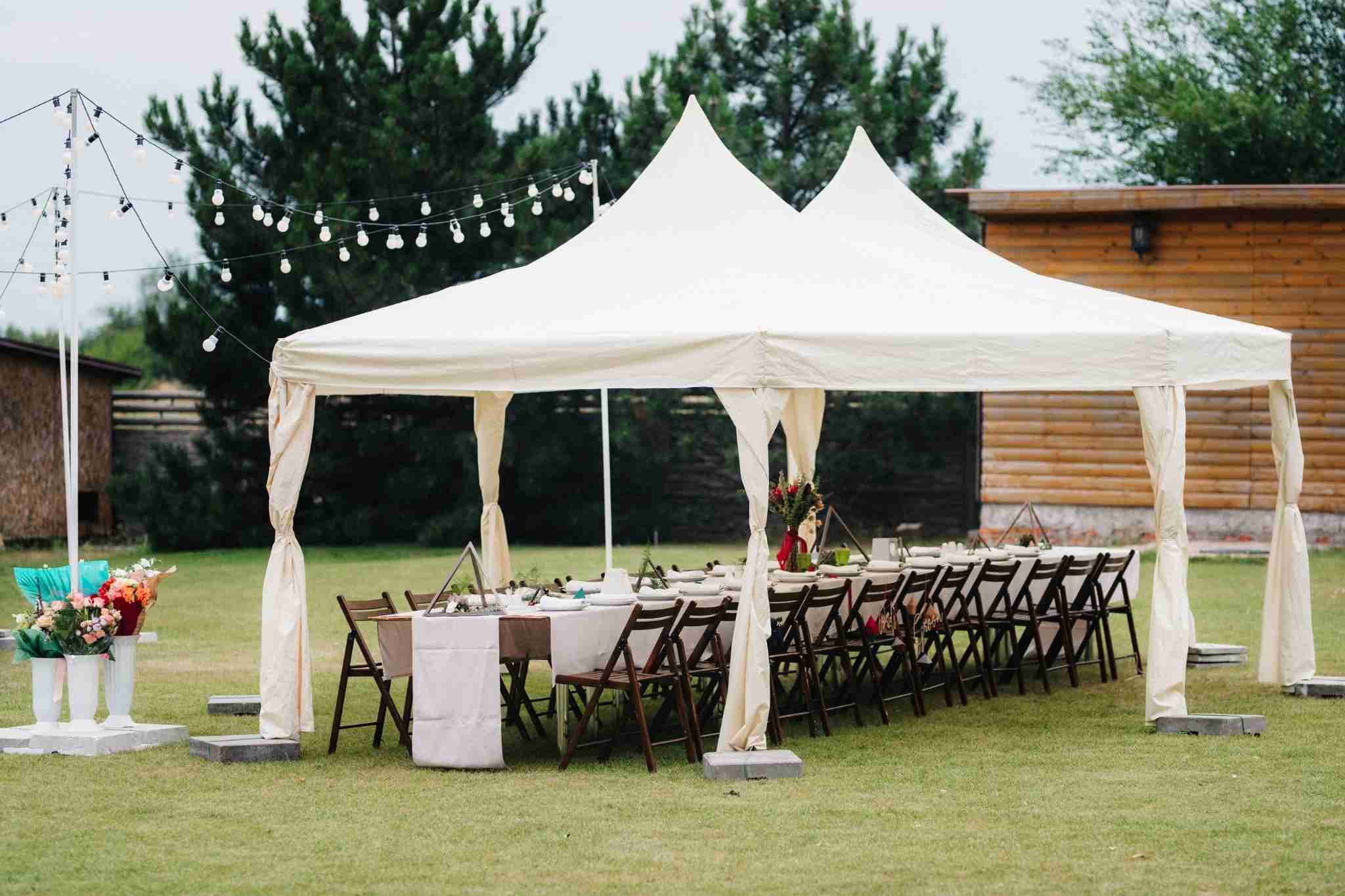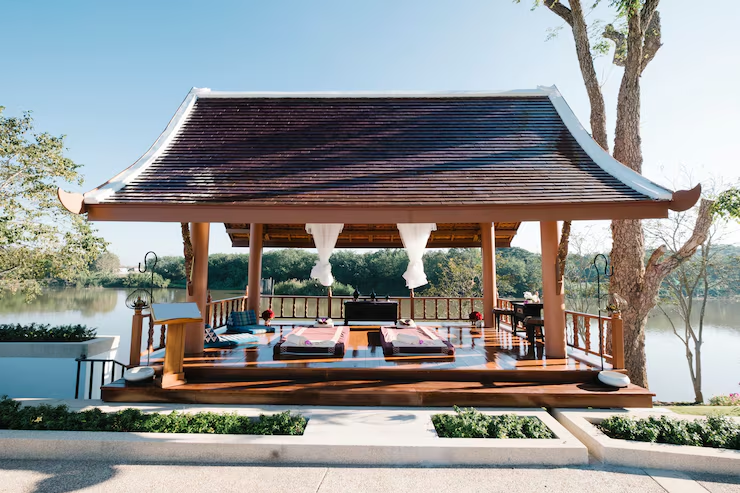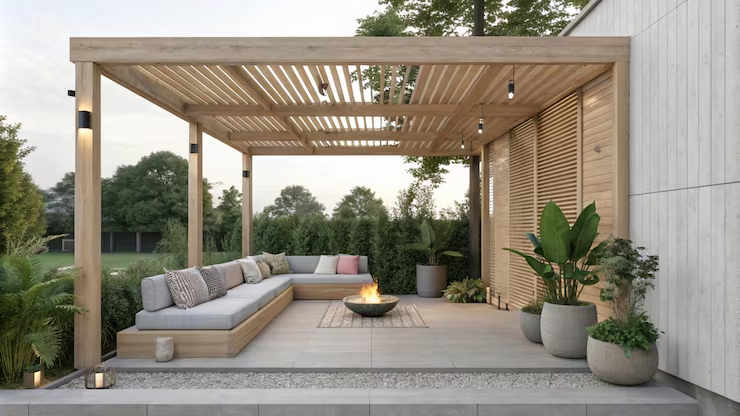Renting a tent can provide shelter and style, making it a popular choice for weddings held in gardens, parks, or backyards. However, understanding the costs associated with renting a tent for a wedding and the various factors that influence the price can be overwhelming.
Table of Contents
How Much to Rent a Tent for a Wedding
Top 4 Factors That Influence Tent Rental Costs
4. Additional Accessories and Extras
How to Save on Tent Rental for Your Wedding
Frequently Asked Questions (FAQs)
Ready to Elevate Your Wedding? Contact Durkin’s for the Best Tent Rentals!
Key Takeaways
| ✔ Tent rental costs vary greatly based on factors like size, style, and the number of guests you’re expecting, with larger tents costing significantly more. ✔ Frame tents are generally the most popular and provide an unobstructed view, but pole tents tend to be more affordable, while clear-top and sailcloth tents offer a more upscale, dramatic appearance for higher prices. ✔ The location of your wedding can impact the cost, as delivery, setup, and additional site requirements like permits or generators will drive up the price. ✔ Extra features like flooring, lighting, and heating or cooling units can significantly increase the total cost of your tent rental, though they can also enhance the comfort and ambiance of your event. ✔ Be sure to consider your venue and climate when selecting your tent, as certain weather conditions may require more robust options, influencing both the rental price and your overall wedding setup. |
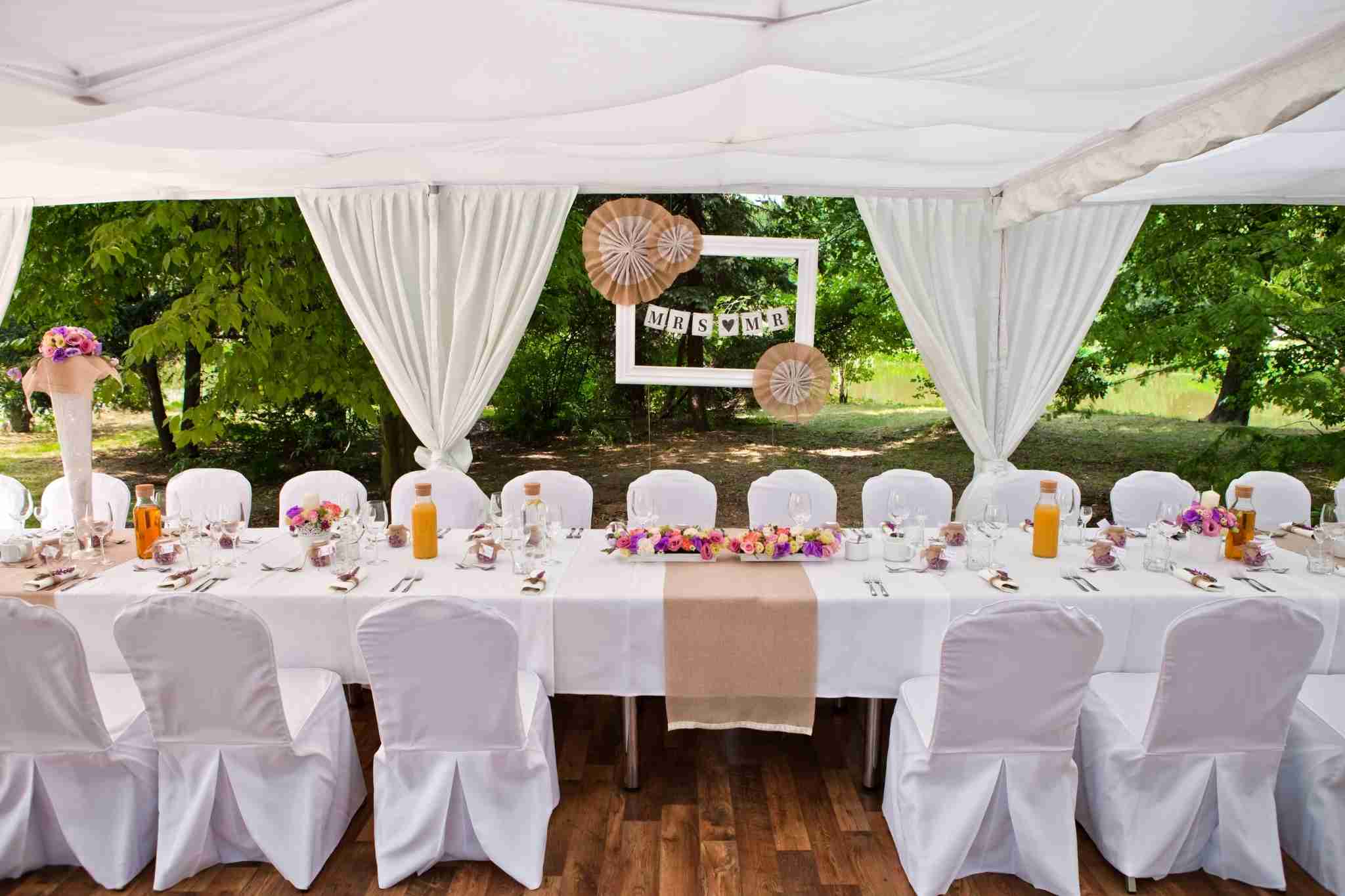
How Much to Rent a Tent for a Wedding
When planning a wedding, one of the first questions couples ask is: How much to rent a tent for a wedding? Experts suggest that a basic setup typically costs around $50,000, while luxury build-outs can range from $200,000 to $500,000.
To break it down, here’s an example:
| Size | Layout Capacity | Frame Tent Rent | Pole Tent Rent |
| 20×40 | Ceremony: 114, Cocktail: 100, Banquet: 80, Sit-Down: 67 | $900 | $750 |
| 30×60 | Ceremony: 257, Cocktail: 225, Banquet: 180, Sit-Down: 150 | $2,050 | $1,350 |
| 40×40 | Ceremony: 229, Cocktail: 200, Banquet: 160, Sit-Down: 133 | $1,800 | $1,500 |
| 40×60 | Ceremony: 343, Cocktail: 300, Banquet: 240, Sit-Down: 200 | $2,700 | $2,100 |
| 40×80 | Ceremony: 457, Cocktail: 400, Banquet: 320, Sit-Down: 267 | $3,600 | $2,400 |
| 40×100 | Ceremony: 571, Cocktail: 500, Banquet: 400, Sit-Down: 333 | $4,500 | $3,000 |
DISCLAIMER: Please note that the available tent sizes and rental prices may vary depending on your location and the specific rental company. The information provided in this chart is a general guide and may not reflect the most up-to-date pricing or availability in your area. For accurate information regarding tent sizes, availability, and rental costs, we recommend contacting a local tent rental provider like Durkin’s directly.
Top 4 Factors That Influence Tent Rental Costs
Renting a tent for your wedding can be a fantastic way to create a unique and memorable atmosphere. However, before diving into the process, it’s essential to understand the factors that influence the costs of tent rentals.
1. Tent Size and Capacity
The most significant factor in determining how much to rent a tent for a wedding is the size of the tent. The number of guests you expect to attend your event plays a vital role in the overall cost of the rental. For larger guest lists, you’ll need a bigger tent, and that naturally increases the price.
- Small Tents (50-100 guests): These can typically cost anywhere from $300 to $1,200 depending on the style of the tent and the accessories included. Small tents are best for intimate weddings or smaller receptions.
- Medium Tents (100-200 guests): For weddings with a medium guest count, the cost generally ranges from $1,000 to $2,500. At this size, you’ll need to consider things like extra lighting and flooring, which will add to the total cost.
- Large Tents (200+ guests): A large outdoor tent for a wedding is necessary for larger gatherings and could cost between $2,500 and $5,000 or more. A tent wedding reception this size may also require additional services like power generators, custom flooring, and more extensive wedding tent decorations to make the space feel complete.
2. Tent Type and Style
The style of your tent will also significantly affect the price. There are several tent options, each with its own aesthetic and functionality, and the choice you make will influence your overall rental costs.
- Pole Tents: These classic tents are the most affordable and are usually priced lower than other styles. They use poles in the center and along the edges to hold the tent up. However, these poles can limit seating arrangements and the space you have for your event.
- Frame Tents: Frame tents are a more modern option, offering a clear, open space without poles obstructing the view. These tend to cost more than pole tents due to their added structural support but are a great choice if you want an unobstructed setup for your tent wedding reception.
- Clear-Top Tents: If you’re envisioning a more romantic or dramatic setting for your wedding, clear-top tents are perfect. These tents let natural light pour in and offer a unique view of the sky, making them an ideal option for evening weddings. However, they can cost 30-50% more than traditional tents. If you’re planning a wedding tent with lights, this option offers the added benefit of letting the lights shine through the clear material, creating a stunning visual effect.
- Sailcloth Tents: These tents are made of a soft, translucent material that creates a beautiful aesthetic. Their unique high peaks and elegant design come with a higher price tag. These tents are perfect for more upscale weddings but can be up to 50% more expensive than a regular frame tent.
3. Location and Venue
The location of your wedding plays a crucial role in determining rental costs. The further your tent needs to be transported, the higher the delivery and setup charges will be. Some key points to consider:
- Distance from Rental Company: If your wedding venue is far from the rental company’s location, you may have to pay additional fees for transportation and setup. For remote venues or areas with difficult access, delivery fees may rise significantly.
- Type of Venue: The kind of venue also influences the cost. If you are having a tent wedding reception in a backyard or park, you may need to account for additional permits, site preparation, or restrictions on tent setup. This may require extra equipment, like flooring or even generators.
- Weather Conditions: While not always obvious, certain locations with unpredictable weather conditions may demand more robust tenting options. For example, weddings in areas prone to rain or wind may need stronger tents or added protection, such as sides or custom coverings, which can increase costs.
4. Additional Accessories and Extras
Beyond the tent itself, there are several add-ons that can drive up costs. While these may not always be essential, they can certainly enhance the ambiance and functionality of your tented wedding.
- Flooring: If the tent is set up on grass, dirt, or uneven ground, you’ll need to rent flooring to ensure your guests are comfortable. Depending on the material you choose, flooring can add anywhere from $1 to $5 per square foot. The type of flooring you choose (wood, carpet, etc.) will affect the price. For a wedding tent with lights, a wooden or carpeted floor can elevate the aesthetic while providing a stable surface.
- Lighting: A wedding tent with lights creates a magical atmosphere, especially during evening or nighttime events. Whether you opt for chandeliers, string lights, or LED uplighting, lighting is essential to setting the right tone. Costs for lighting can range from $200 for simple string lights to $1,000 or more for elegant chandeliers and specialty lighting setups.
- Heating and Cooling: Depending on the season, you might need heating for winter weddings or cooling solutions for summer ones. This can be an additional $500 to $2,000 based on the size of your tent and the number of units needed.
- Tent Decorations: Personalizing your wedding tent with decor like drapery, floral arrangements, and furniture can significantly impact your rental costs. However, these additions can make the tent feel more intimate and custom to your theme. The cost of decorations varies widely, so it’s essential to work within your budget.
How to Save on Tent Rental for Your Wedding
Renting a tent for your wedding can be one of the most significant expenses in your overall wedding budget. However, there are several ways to cut down on costs without compromising the look and feel of your event. Here are some practical tips on how much to rent a tent for a wedding while staying within your budget:
1. Book Early
Booking your tent rental well in advance is one of the best ways to save money. Tent rental prices can increase as the wedding date approaches, especially during peak wedding seasons like summer and fall.
- Early Bird Discounts: Many rental companies offer discounts for early bookings, often 6–12 months in advance. Take note: September is the best month for tented weddings!
- More Availability: Booking early ensures you get your preferred tent style and size without availability issues.
- Negotiate Pricing: With more time to plan, you can take the opportunity to negotiate better prices with your rental company.
2. Choose a Simpler Tent Style
While high-end tents like sailcloth tents or clear-top tents are visually stunning, they come with a hefty price tag. If you’re looking to save, consider opting for a simpler tent style.
- Affordable Pole Tents: These tents are often the most cost-effective choice and still offer an elegant, classic look.
- Frame Tents for Flexibility: Frame tents are versatile and can fit in a variety of locations, offering more space without the high cost of clear-top tents.
- Minimalist Design: Keep it simple. A basic tent can still be beautiful when paired with the right wedding tent decorations, avoiding unnecessary frills that add up in costs.
3. Limit Extra Features and Add-ons
Tent rentals often come with numerous add-ons, such as flooring, lighting, and custom decorations. While these extras can enhance your wedding’s atmosphere, they also add up quickly. To stay within budget:
- DIY Wedding Tent Decorations: Rather than renting expensive decor from the rental company, consider creating your own table settings, centerpieces, or drapery. Simple touches can make a big impact without the high cost.
- Affordable Lighting Options: Instead of renting costly chandeliers or elaborate lighting setups, use affordable options like string lights, lanterns, or battery-operated candles to create a cozy and romantic ambiance.
- Skip Expensive Flooring: If your large outdoor tent for a wedding is placed on a solid surface like grass or gravel, skip the premium flooring options. Stick with basic flooring for high-traffic areas, like where guests will walk or sit.
4. Consider the Size and Layout
A larger tent may seem like a good idea to ensure ample space for guests, but it’s important to only rent the size you need. Renting a tent too large for your guest count means paying for unused space, which increases the overall cost.
- Accurate Guest Count: Start by calculating the exact number of guests you’ll have, including the space needed for tables, a dance floor, and catering stations. This will help you avoid overpaying for an unnecessarily large tent.
- Flexible Layout: Discuss layout options with your rental company to make the most of the space you have. A smaller, well-planned layout can reduce your tent size needs.
- Choose a Tent That Fits: Always double-check with the rental company for guidance on selecting the best tent size based on your guest count and event plans. Renting the wrong size could mean wasting valuable space or overcrowding.
5. Share Costs with Other Wedding Expenses
To save on tent rental costs, consider bundling your rental with other wedding services or sharing the costs with other vendors.
- Bundle Services: Some rental companies offer packages that combine your tent rental with chairs, tables, linens, and lighting. This can help reduce the overall cost of individual rentals.
- Joint Tent Rental: If you’re hosting your wedding at a venue shared with other couples (e.g., a large event space), consider splitting the cost of the tent with them.
- Group Discounts: Ask rental companies about group discounts or incentives for renting multiple items or services from them, such as lighting or flooring.
6. Choose a Less Expensive Location
The venue where your wedding takes place can significantly affect the cost of your tent rental. If possible, consider a location that will minimize additional setup fees.
- Outdoor Weddings in Rural Areas: Venues located outside of cities are often less expensive. Urban venues can rack up high costs due to transportation and permits, so moving your wedding to a rural or more secluded spot could save you money.
- Venue-Specific Discounts: If the venue you’re using frequently hosts weddings, they may offer discounted rates for tent rentals. Check to see if they have an in-house rental service that provides better deals.
- Less Complex Setups: Opt for a location that doesn’t require extra work for setting up or adding additional services, such as generator power or ground preparation, which can add significantly to costs.
7. Rent Only What You Need
When renting a wedding tent, it’s easy to get carried away with extras and unnecessary additions. However, focusing on essentials can help keep your costs down.
- Skip Unnecessary Features: You may be tempted to add extra features like sidewalls, drapes, or elaborate lighting. Only rent these if they’re absolutely necessary to your event’s success.
- Rent Only Essential Furniture: Instead of renting a ton of extra furniture, like lounge areas or multiple seating options, rent only the tables and chairs needed for dining and dancing.
- Cut Back on Extras: Avoid renting extravagant tent features such as high-end flooring or elaborate chandeliers. Instead, opt for simple yet effective alternatives like budget-friendly lights or decor.
8. Get Multiple Quotes
One of the best ways to save on tent rentals is by comparing prices from multiple vendors. This will give you a clear idea of the going rates for different tent styles and sizes.
- Check Multiple Vendors: Contact several rental companies in your area and ask for quotes on the same type of large outdoor tent for a wedding and extras.
- Negotiate for Better Deals: Don’t be afraid to negotiate with your vendor, especially if you’ve received a lower quote from a competitor.
- Consider Off-Peak Seasons: Tent rentals may be cheaper during off-peak seasons or weekdays. Ask for discounts during less busy times.
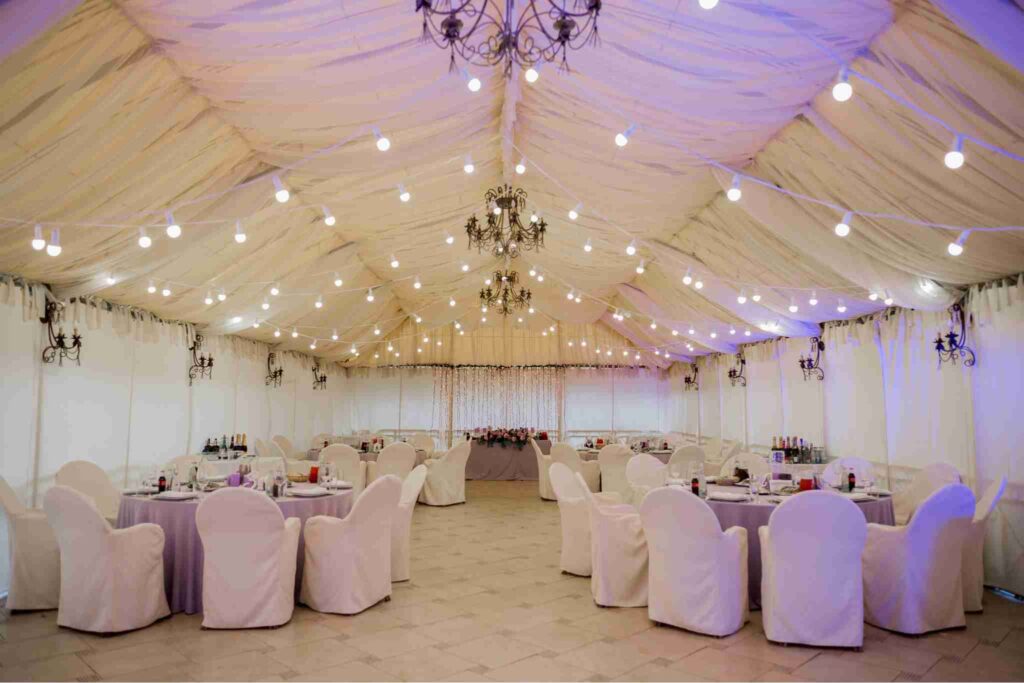
Frequently Asked Questions (FAQs)
What kind of tent is best for a wedding?
When choosing a tent for a wedding, frame tents are often considered the best option. These tents are designed without center poles, offering an open, unobstructed interior that works well for seating arrangements, dancing, and décor. Another excellent choice for larger events is the tension tent. Known for its high-peak roof, this tent style creates a dramatic and elegant atmosphere that enhances the overall aesthetic of the wedding.
What size tent do I need for 40 guests?
For a wedding with around 40 guests, the tent size you choose should ensure ample space for seating, food service, and movement. A 20×20 tent, which offers approximately 400 square feet of space, would comfortably accommodate 40 guests. If you plan to have more space for a buffet or a larger dance area, a 15×30 tent with 450 square feet could also be a suitable choice.
What is the best shape for a tent?
When selecting a tent shape, dome-style tents are popular due to their simple and effective design. These tents use a central crossover node to ensure stability and provide a high peak at the center. This shape maximizes headroom and creates a spacious feel inside, making it a great option for those new to camping or event planning. Its streamlined design is also perfect for smaller, more intimate gatherings.
What makes a wedding tent more expensive?
The cost of a wedding tent can be influenced by several factors that contribute to its overall quality. Expensive tents typically feature thicker, more durable fabric with higher denier ratings for better weather resistance and longevity. Additionally, higher-quality tent poles, often made from materials like aluminum rather than fiberglass, are more costly. Other premium features include more guylines for stability, better waterproofing with higher HH ratings, and enhanced zippers and storage options, all of which raise the price.
How big of a wedding tent do I need for 100 guests?
For a wedding with 100 guests, a 20×40 or 30×40 tent would generally be recommended. These sizes provide ample space for seating, catering stations, and a comfortable flow for your guests. A 20×40 tent can accommodate around 80-100 guests for a banquet-style seating arrangement, while a larger 30×40 tent will allow for additional comfort and flexibility, offering extra space for movement, entertainment, and larger dance floors.
Ready to Elevate Your Wedding? Contact Durkin’s for the Best Tent Rentals!
If you’re looking for reliable, high-quality wedding tents, look no further than Durkin’s Inc. With over 100 years of experience, Durkin’s is the premier source for wedding tent rentals in Connecticut. We offer a variety of tent styles to fit your event’s theme, from elegant garden parties to sophisticated gatherings. Our dedicated team works closely with decorators, planners, and caterers to bring your vision to life, ensuring that every detail is perfect.
Ready to find the ideal wedding tent for your special day in Connecticut? Contact Durkin’s today

